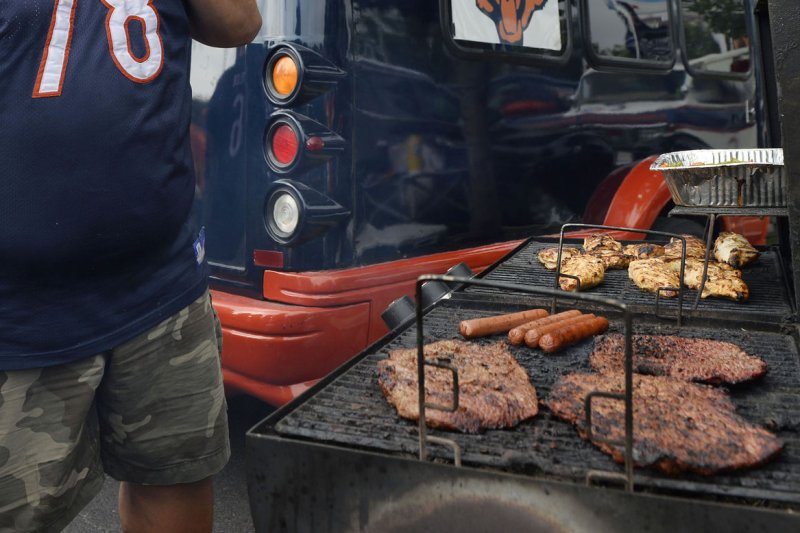Grilling can be a healthy choice if people choose lean cuts of meat, substitute chicken and turkey for ground beef and sausage and add fruit and vegetables. UPI/Brian Kersey |
License Photo
CLEVELAND, May 26 (UPI) -- Grilling can be a healthy choice if lean cuts of meat are chosen, poultry is substituted for ground beef or sausage and fruit and vegetables are used.
Lisa Cimperman, a clinical dietitian at University Hospitals Case Medical Center in Cleveland, said grilling need not mean using fatty meats that cause flare-ups due to melting fat. These flare-ups char meat and increase the risk of creating carcinogens.
Heterocyclic amines and polycyclic aromatic hydrocarbons are chemicals formed when muscle meat -- including beef, pork, fish and poultry -- is cooked using high-temperature methods, such as pan frying or grilling directly over an open flame. The formation of these chemicals is influenced by the meat, the cooking time, the cooking temperature and the cooking method.
Exposure to high levels of these chemicals has caused cancer in animals, but whether this exposure causes cancer in humans is unclear, the National Cancer Institute says.
However, numerous epidemiologic studies using detailed questionnaires to examine participants' meat consumption and cooking methods found those who ate the high levels of well-done, fried, or barbecued meat were associated with increased risk of colorectal, pancreatic and prostate cancer, the NCI says.
No federal guidelines address consumption levels of HCAs and PAHs. HCAs are formed when amino acids, sugars, and creatine -- a substance found in muscle -- react at high temperatures. PAHs are formed when fat and juices from meat grilled directly over an open fire drip onto the fire, causing flames.
Avoiding direct exposure of meat to an open flame or a hot metal surface and avoiding prolonged cooking times at high temperatures can help reduce HCA and PAH formation, the NCI says.
In addition, using a microwave to cook meat prior to exposure to high temperatures can reduce HCA formation by reducing cooking time.
Turning meat over and over on a high heat source can significantly reduce HCA formation, and cutting off charred parts of meat and not using gravy made from meat drippings can also reduce these chemical exposures.
For healthier grilling, Cimperman suggests using seafood, fruit such as pineapple or peaches and vegetables.
"Marinade vegetables and the grill caramelizes the natural sugars, enhancing the natural flavors in zucchini, squash, Portobello mushrooms, peppers and tomatoes," Cimperman says in a statement.
"That's a great way to cut back on calories in your diet and fill-up and add some really great nutrition as well."















